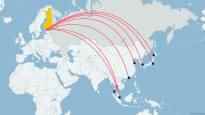Overflights by European airlines to Asia have continued uninterrupted in Russian airspace. Revocation of overflight rights would result in Russian companies being denied access to Europe, and Finland could block Russian flights to North America
Finnair and other European airlines have continued uninterrupted flights via Russian airspace to Asia.
However, the EU is already preparing for a situation in which Russia would suddenly revoke overflights from airlines. It would suspend, for example, Finnair’s flights to Asia.
– As part of common European measures, we could consider restricting Russian flights. Nationally, the legislation allows for this in situations where it is obvious that reciprocal action by the applicant state would not be possible, says Traficom, Director General of the Finnish Transport and Communications Agency Jarkko Saarimäki.
For airlines, the Russian route is the fastest and shortest connection between Europe and Asia. The alternative would be to circumnavigate the south of Russia via the Gulf, which would increase flight time by several hours and make it difficult for Finnair, for example, to continue flights to Asia.
Finnair has previously flown in Russia during geopolitical tensions
Finnair flies the majority of Asian flights through Russian airspace. The company also operates direct flights from Helsinki-Vantaa to St. Petersburg and Moscow.
There are no restrictions in Russian airspace that would affect Finnair’s operations.
– In the past, there have been tensions during which Finnair has been able to safely operate flights over Siberia, says Finnair’s CEO Topi Manner.
However, the mainland is not going to assess whether the situation in Ukraine could lead to the revocation of overflight rights.
Finland could block Russian flights to Cuba and the United States
Any restrictions on Russia’s use of Siberian airspace would have a major impact on companies operating between Europe and Asia. In practice, most flights would have to be canceled.
Such restrictions were considered by Russia in 2014 when the EU extended economic sanctions against Russia, which also applied to the low-cost airline owned by Aeroflot.
However, the restrictions are not considered very likely, as Russia would at the same time lose several hundred million euros in revenue that it charges airlines from crossing Siberia. The majority of the overflight charges collected by Russia are paid directly to the country’s national airline Aeroflot.
The EU has been considering a possible retaliation to prevent Russian airlines from entering EU airspace.
For example, Finland could refuse to provide air traffic control services to Russian airlines flying to Cuba and North America via Finnish airspace. Passenger flights departing from Moscow enter Finnish airspace at Lappeenranta and leave south of Vaasa. In practice, they are in Finnish airspace for a short time.
According to Finntraffic Lennonvarmistus oy, which is responsible for managing the use of Finnish airspace, about a hundred overflights are flown daily via Finland to Russia via Russia. Any restrictions would not necessarily apply to all air transport.
– It is possible that the flight ban in Russia would apply to European airlines, for example, but the Japanese, for example, could continue flights, says Finntraffic Lennonvarmistus oy’s CEO Rainer Luojus.
Luojus calculates that if all overflights through Finland were to be interrupted, it would reduce the route revenues collected by Finland by approximately EUR 11 million.
